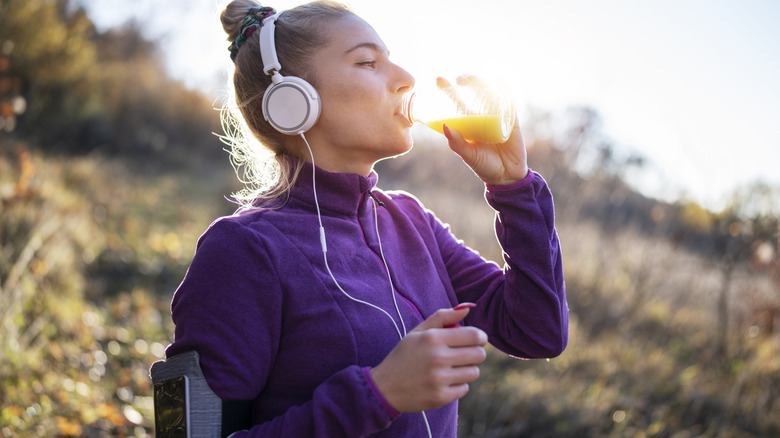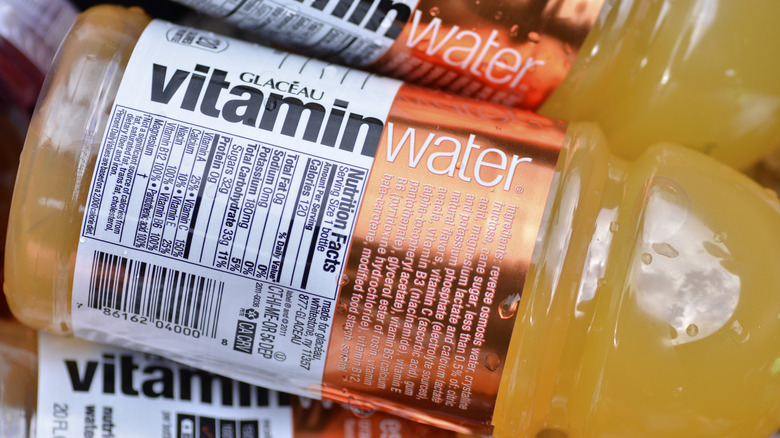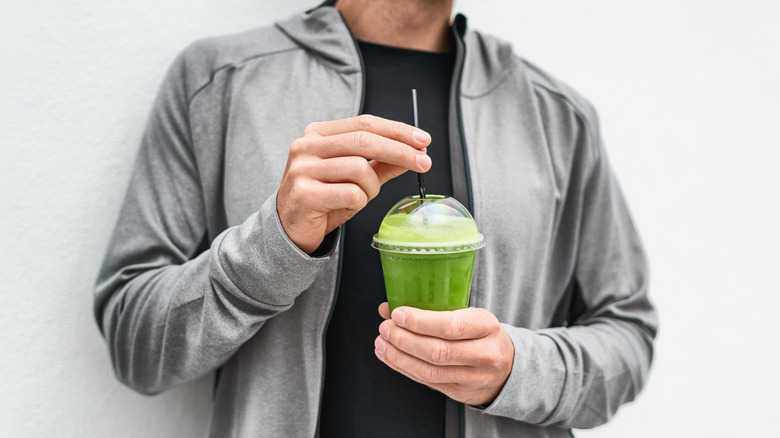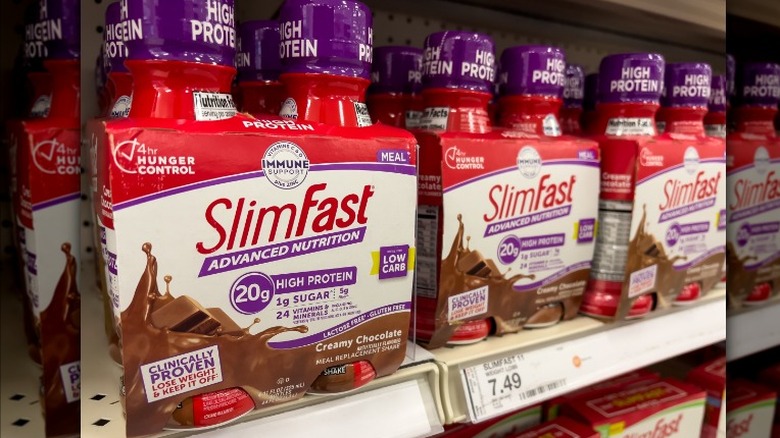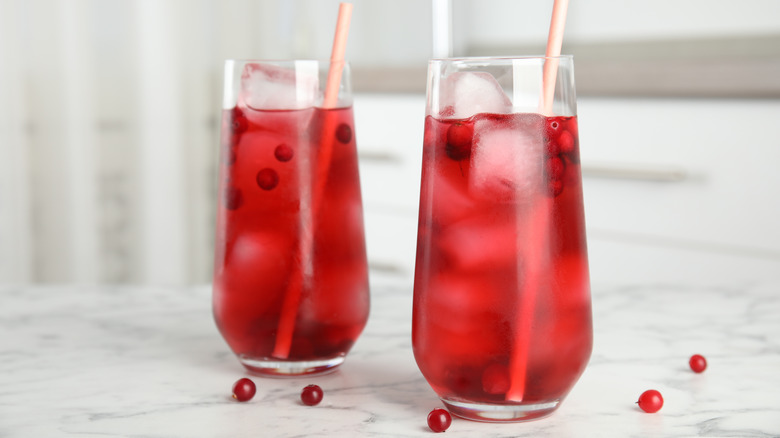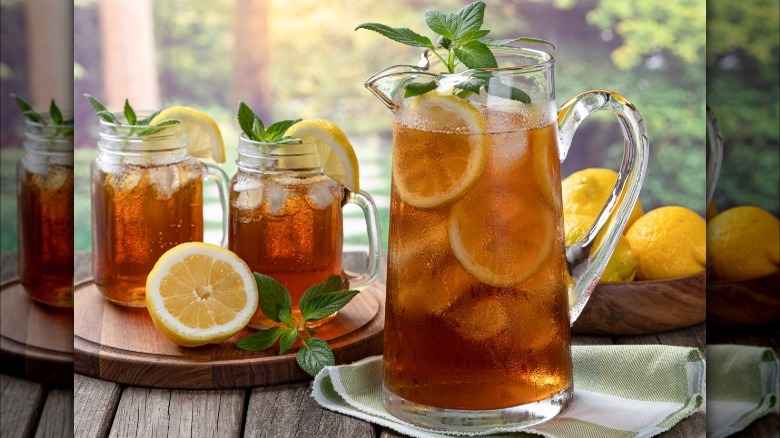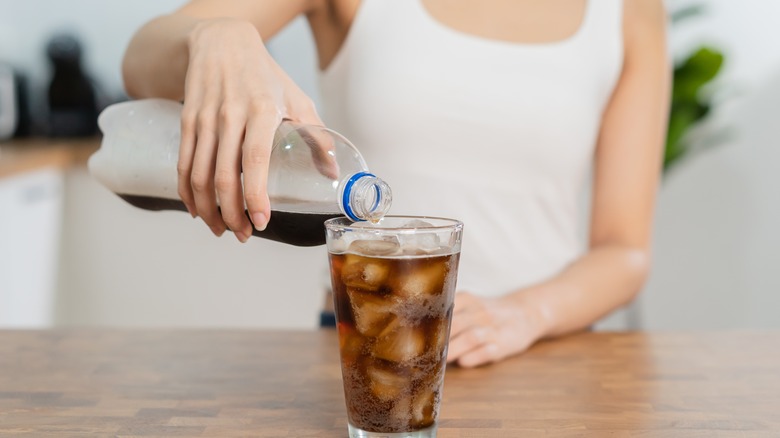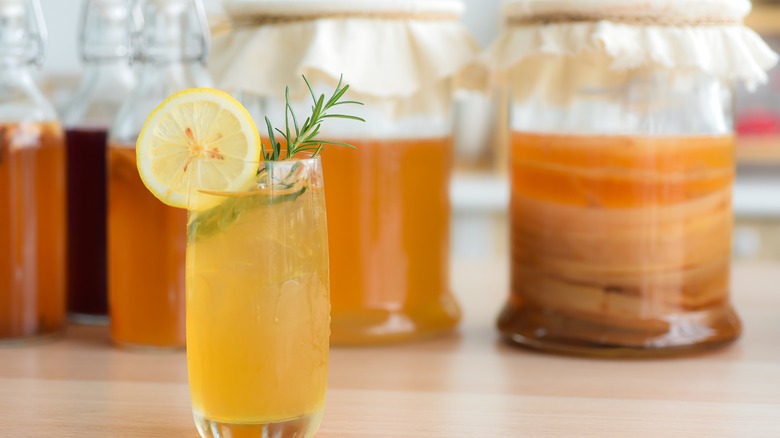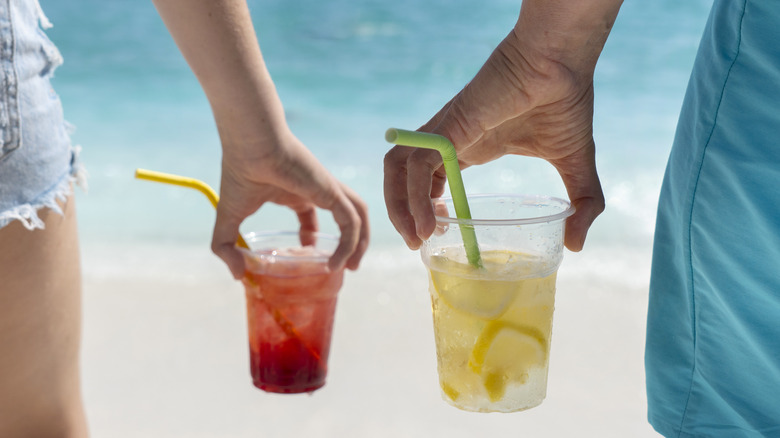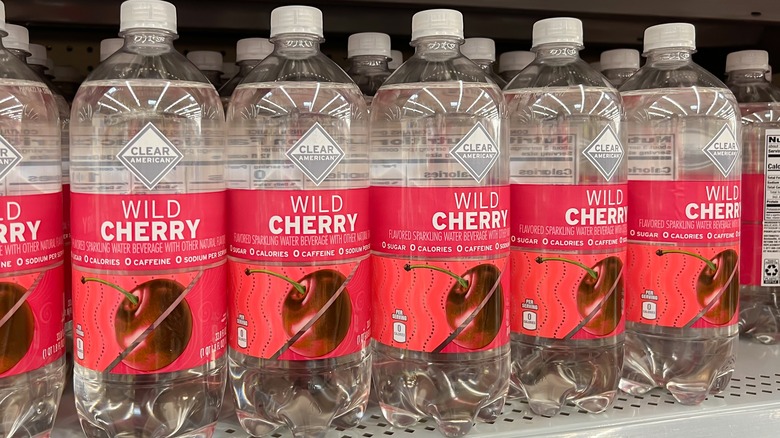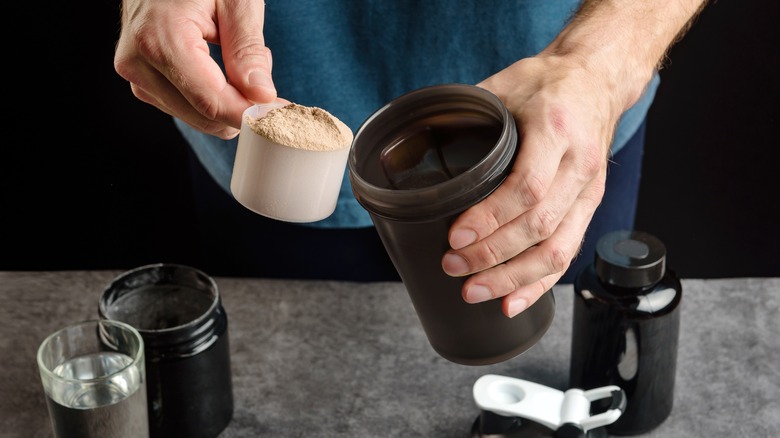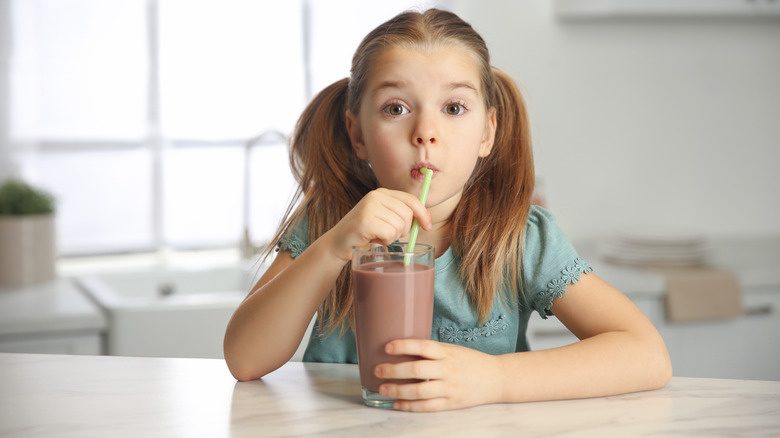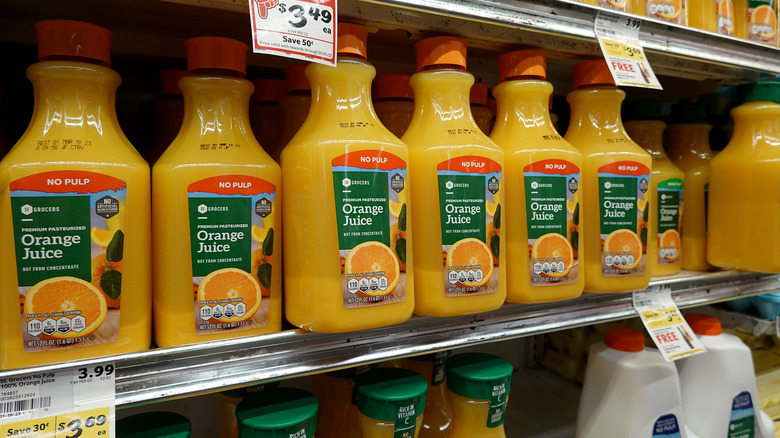Fake Healthy Drinks You Should Think Twice About Before Buying Again
In pursuit of a healthy lifestyle, we all strive to make mindful choices about the food we consume. But what if we told you that the very "healthy" pick you've been relying on might not be as virtuous as it seems? Unfortunately, many beverages marketed to the public as "good for you" can come with a wide range of health consequences if consumed regularly. From drinks marketed to athletes to those marketed to young children, it is important to stay informed about what you use to fuel your body to ensure your health stays in tip-top shape.
In this article, we'll delve into the many beverages that may not quite be what they seem in terms of health. These fake healthy drinks can cause a wide range of issues with your body, especially when they are consumed often over a long-term span. Ready to uncover the shady truth about these purported "health" drinks? If so, buckle up. We're getting started!
Sports drinks
Sports beverages have long been hailed as the ultimate health drink, often offering much-needed rejuvenation during intense physical workouts. These drinks combine the effects of sugar in various formats, along with electrolytes and B vitamins to bring you the energy and hydration needed to complete a high-intensity exercise. Brands like Gatorade and Bodyarmor offer enticing flavors that seamlessly blend the joy of consumption with the efficacy required for an optimal workout. Sadly, these drinks can also contribute to weight gain, which is associated with diabetes, heart disease, and some cancers (via Harvard School of Public Health) .
Sports drinks like Gatorade are actually only most effective for people who engage in rigorous exercise for over an hour or more (via Harvard School of Public Health). It is for this reason that athletes may reach for Gatorade as they engage in strenuous exercise for hours on end. This high-intensity movement motivates the body to burn sugar and calories and, thus, helps them avoid weight gain. For the average individual? Drinking Gatorade or other sports drinks that contain sugar and high fructose corn syrup are well-documented to have negative effects on health when consumed in excess (via Cleveland Clinic)
It is also worth noting that some brands (like Gatorade) make use of artificial coloring to make their sports drinks brighter and more appealing. Some of these colors and dyes have been linked to many antagonistic health outcomes, especially when consumed on a regular basis by children (via OEHHA). Ouch.
Vitamin-infused water
Surprised at the inclusion of vitamin-infused water on our list of deceptive healthy beverages? Like it or not, these drinks are notorious for adding sugar to your diet, though the ingredients on the label may be a bit misleading. Vitaminwater, for example, is a popular vitamin-infused water touted as a deliciously refreshing health drink. While it certainly does contain a surplus of vitamins you can feel good about, issues arise when you consider phrases like "crystalline fructose" and "cane sugar" printed on the label. While these might seem like better options when compared to "normal" sugar or high fructose corn syrup, the truth is that both crystalline fructose and cane sugar will reap similar devastating consequences on your health (via Livestrong).
On top of this, depending on which brand of vitamin-infused water you choose, you may also end up consuming 22 grams of sugar or more in a single bottle serving, which happens to be close to the amount of sugar women should consume in an entire day. As a result, it is imperative that you limit the amount of sugary vitamin-enhanced water you consume, despite the possible benefits you'd gain from drinking it. Vitamins are good for your body, but the added sugar may lead negative consequences, especially when gulped frequently over time.
Fast food smoothies
If you're ever tempted to order a "healthy" fast food smoothie, you may want to think twice before doing so. More times than not, you'll discover that these drinks are laden with added sugars, making them not much better of a choice than a soda in some cases. Take Dairy Queen's Orange Julius, for example. This popular and flavorful smoothie contains 48 grams of sugar, which is almost twice the daily value for sugar consumption in women. It also contains more sugar than a can of Coke, which registers at 39 grams of sugar per can.
Does this mean that smoothies don't have their benefits? Of course not. Choosing a drink blended with fruit over a plain sugar soda is almost always a better choice, but we just want you to be aware that the added sugar in both options can lead to fatty liver disease, high blood pressure, diabetes, and increased risk of stroke (via Harvard Health Publishing). For this reason, it's best to limit your consumption of fast food smoothies and defer instead to making them at home whenever possible.
Meal replacement shakes
Meal replacement drinks have proven their longevity, enduring as a convenient and nutritious solution for avoiding high-calorie feasts. And though drinks like SlimFast may not be as popular now as they were in the '90s, they're still easily found on grocery store shelves — though they may come with different names and in varying formats.
The problem with these drinks is that though they may act as meal replacers to suppress your appetite and prevent you from overeating, they also contain a variety of problematic ingredients to make them taste better. The result is a sugar-loaded hodgepodge of a sip that also contains artificial ingredients that, when consumed regularly, may do a number on your health in more ways than one.
Eating foods that are heavily processed, such as those that contain added sugar, high fructose corn syrup, as well as artificial ingredients, have been shown to increase the risk of specific types of cancer in certain individuals. There are also a number of other risk factors involved with eating high-processed foods, such as increased risk for heart disease and the development of diabetes (via Medical News Today).
Cranberry juice cocktail
Cranberry juice is often touted for its many health benefits, especially those relating to preventing urinary tract infections in women (via WebMD). Unfortunately, not all cranberry juices are created equal, and you should approach those labeled as cranberry juice "cocktail" with caution, despite the drink containing cranberries as a main ingredient.
So, why has cranberry juice landed on our list of fake healthy drinks? As mentioned, there are several cranberry juice types, with some consisting of pure cranberry and fruit juice flavors, and others containing sugar and high fructose corn syrup. Since cranberry juice can be so bitter and overwhelming to drink, you may find it difficult to find a juice that is 100% pure cranberry. Still, traditional cranberry juice cocktails will contain an abundance of sugar, which may outweigh any positive effects cranberry juice may potentially have on your health.
The solution to this? Try selecting cranberry juice marked as 100% juice, and do your best to avoid juices labeled as "cocktail." Cocktail juices are almost certain to contain added sugar, whereas those labeled as 100% juice often derive their sweetness naturally from cranberries and other fruit juices, enhancing the cranberry flavor to perfection.
Iced tea
Many make the false presumption that choosing an iced tea over sugary soda will earn them points in the health category, when in actuality, they are only trading in one sugar-infused drink for another.
Unless you are choosing to down a cupful of unsweetened tea (which may taste bitter to the palette if you're used to the sweet tea variety), you can expect your average sweetened tea to contain 18 grams of added sugar per 12 fluid ounces. Although the sugar level may be lower compared to many sodas of the same size, it should still be noted that 18 grams of sugar, especially if you're drinking multiple servings, can add up quickly.
Note that it is entirely possible to buy unsweetened tea, and sweeten it up on your own using sugar packets, honey, or natural maple syrup. Doing it this way helps you control the amount of sugar in your tea, and also helps you sidestep icky additives like high fructose corn syrup, often found within sweet tea varieties.
Diet soda
As their name would imply, diet sodas are marketed as drinks that should help you lose weight or "diet" effectively to achieve your desired health goals. Indeed, the absence of sugar and high fructose corn syrup can be beneficial for your body, but more studies need to be conducted to prove that artificial sweeteners like aspartame and sucralose are safe for long-term consumption.
According to Healthline, the effect of aspartame on individuals may vary, depending on their sensitivities. Reported claims from certain individuals experiencing negative outcomes after drinking aspartame include effects such as cancer, high blood pressure, kidney disease, and more, although there is still a need for additional studies to be conducted to determine whether these claims have any real substance. Findings regarding sucralose are similar, with some studies showing that little impact on weight loss is actually achieved when replacing sugar with sucralose, along with an increase in inflammation found as a result of testing on animals (via WebMD).
Though both aspartame and sucralose have been deemed safe by the FDA, more studies need to be conducted to determine whether these substances will have long-term consequences on your health. Until then, it may be wise to avoid these drinks, especially if you drink them often.
Kombucha
Kombucha is a trendy, much sought-after drink, known for its fizzy, fruity, and slightly tart appeal. According to the MD Anderson Cancer Center, this beverage is excellent for relieving the body of inflammation while also potentially reducing your risk of developing certain types of cancer. Having said that, many brands these days contain added sugar, meaning that if you aren't careful, the anti-inflammatory benefits could end up being toppled by the extra sugar used to mask the acidic flavors in this naturally tart drink.
Thankfully, there are many brands out there that are sensitive to the fact that too much sugar could outweigh kombucha's health benefits, and therefore, go through the effort of providing lower sugar content for buyers to enjoy. Just know that not all kombucha brands are created equal, so keep your eye on the nutrition label and ingredient list to ensure you've got a brand worth buying.
Lemonade
Lemonade is often thought to be a healthy and flavorful way to defeat hydration in the summer. This bright and sunny beverage is chock-full of lemony goodness, and as a result, may be considered a delicious and healthy alternative to soda when the scorching sun is beating down.
The problem? Though what you're drinking does contain some lemon juice, lemonade is made of mostly water and sugar. This is done to lessen the tart effects of the lemon juice and convert its typical sour flavor to something more pleasing to the palate. Thus, if you do grab a glass of lemonade, know that it likely has a ton of sugar, and won't benefit your health.
In fact, a quick scan of the nutrition label on commonly sold lemonades shows that it often contains over 28 grams of sugar in each 8 fluid ounce glass. Just goes to show that everything isn't always as it seems. Though a refreshing drink with a slight amount of fruit juice, added sugar can contribute to issues with blood sugar, and other negative effects often associated with consuming too much sugar on a regular basis (via Harvard Health Publishing).
Flavored water
Flavored water is usually hailed as the ultimate way to stay hydrated without having to push through the dull and drab taste that normal water offers. As a result, most people grab these flavored concoctions assuming that they're doing their bodies a favor. The truth? Though flavored waters don't typically contain added sugar, they do contain those controversial artificial sweeteners we warned you about earlier, with some indicators seeming to suggest that artificial sweeteners could do more harm than good.
Does this mean you have to abandon flavored water forever? Not quite. But since studies are somewhat inconclusive on the long-term effects certain artificial sweeteners may have on the human body, we'd advise drinking plain ol' water. If you can't stomach the drab flavor that natural water provides, consider jazzing things up a bit by infusing it with natural fruit flavors of your own. A mint leaf, sliced strawberry, or a few chunks of pineapple might prove to be the trick for giving your water that hint of something extra it needs.
Protein shakes
Protein shakes are very popular for increasing protein in the average diet. While protein shakes can repair muscles and enhance overall performance in the gym, they are often very high in sugar and can lead to health problems (via Healthline).
According to Harvard Health Publishing, a single scoop of protein powder may register at around 23 grams of sugar per scoop. Protein powders can also be high in calories, making them a less-than-stellar option if your goal is to lose weight. On top of these concerns, the concept of adding too much protein to your diet is still under scrutiny, as limited information exists as to whether the use of protein long-term will benefit or harm health. Not to mention, some protein powders may contain toxic contaminants like pesticides and even heavy metals, making them an unsafe choice no matter what your fitness goals might be.
All in all, protein shakes may not be all they're cracked up to be in the health and wellness category. Thus, you should only drink protein shakes and drinks with caution ... if at all!
Chocolate milk
For years, chocolate milk has been served to students in cafeterias on the premise that milk is an essential and foundational beverage to support the health and growth of children. While this may still be true of both regular and flavored milk options, the truth is that the latter contains added sugar, and may increase the risk of health issues often associated with high-sugar diets in school-aged children.
As a result of the amount of sugar in chocolate and other flavored milk types, there has been a call to action to reduce the amount of sugar added in drinks served to elementary, middle, and high school-aged children. Despite these changes, it's important for adults to also understand that chocolate milk may not be quite as healthful an option as its unflavored counterpart due to the high levels of sugar.
Indeed, a quick scan of chocolate milk labels reveals that there's far too much sugar (and sometimes even artificial flavorings) in chocolate milk for it to be considered a healthy beverage. Therefore, it's best to forgo flavored milk and defer to unflavored milk instead. Doing so may not taste as appetizing, but it'll provide the nutrients you need without the disadvantages of added sugar.
Orange juice
If you're surprised to see orange juice make the list, don't feel bad; we felt the same way. Orange juice can benefit your body with its hefty dose of vitamin C and flavonoids known for aiding in the reduction of inflammation (via The Whole U). So, why is orange juice considered unhealthy in some circumstances?
Unlike the many other fake healthy drinks on this list, true orange juice doesn't contain any added sugar. Instead, you'll find that your orange juice is full of natural sugars, but without the natural fiber of the actual fruit which is known to slow the absorption of the sugar in the juice. The result is a shock to your system and spiking glucose levels as your body is hit with a ton of sugar and no fiber to stop it.
In addition, eating the actual fruit rather than simply consuming the juices works to make you feel fuller for longer. Without the natural fiber of orange juice, you shouldn't expect to feel full from drinking it, despite the fact that the juice comes from many oranges. This leads to the overconsumption of sugar and calories without the satisfactory feeling that fruits generally provide. Because of this, fruit juices like orange juice should be consumed only moderately. Bummer!
